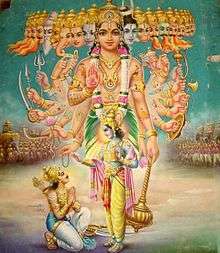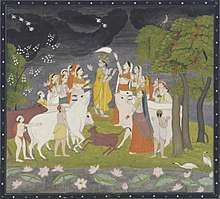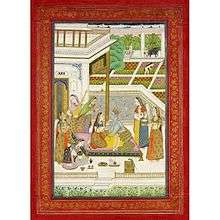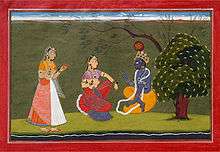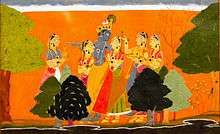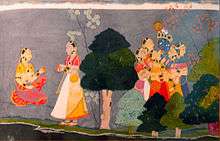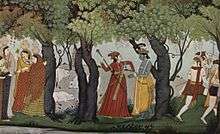Krishna (Sanskrit: कृष्ण, Kṛṣṇa in IAST, pronounced [ˈkr̩ʂɳə], meaning "black" or "dark") is the most widely revered god of Hinduism, worshipped across many traditions of Hinduism in a variety of different perspectives. While many Vaishnava groups recognize him as an avatar of the god, Vishnu; some traditions within Krishnaism, consider Krishna to be svayam bhagavan, or the Supreme Being. Krishna's disappearance marks the end of Dvapara Yuga and the start of Kali Yuga (present age), which is dated to February 17/18, 3102 BCE. Worship of the deity Krishna, either in the form of deity Krishna, either in the form of Vasudeva, Bala Krishna or Gopal can be traced to as early as 4th century BC.
- See also:
- Bhagavad Gita sayings of Krishna not repeated here
Quotes
_Vrindavan_India.jpg)

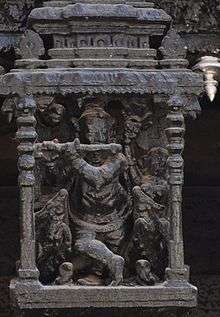
- Let it be clear that Raja Krishna, according to what has been revealed to me, was such a truly great man that it is hard to find his like among the Rishis and Avatars of the Hindus. He was an Avatar—i.e., Prophet—of his time upon whom the Holy Spirit would descend from God. He was from God, victorious and prosperous. He cleansed the land of the Aryas from sin and was in fact the Prophet of his age whose teaching was later corrupted in numerous ways. He was full of love for God, a friend of virtue and an enemy of evil.
- Ghulam Ahmed in: Hazrat Mirza Ghulam Ahmad Lecture Sialkot, Islam International, 2007, p.39
- The Bhagavad Gītā, also more simply known as Gita, is a Sanatana Dharma or Hindu scripture produced from the colloquy given by Sri Krishna to Arjuna during the w:Kurukshetra WarKurukshetra War. Its philosophies and insights are intended to reach beyond the scope of religion and to humanity as a whole. The context of the Gita is a conversation between Lord Krishna and the Pandava prince Arjuna taking place on the battlefield before the start of the Kurukshetra War. Responding to Arjuna's confusion and moral dilemma about fighting his own cousins, Lord Krishna explains to Arjuna his duties as a warrior and prince, and elaborates on different Yogic and Vedantic philosophies, with examples and analogies;
- Edwin Arnold in: The Bhagavad Gita (Arnold translation), Wikisource
- Sri Aurobindo on the the Gita, on Krishna as godhead, his aura and the Krishna consciousness There are four very great events in history, the siege of Troy, the life and crucifixion of Christ, the exile of Krishna in Brindavan and the colloquy with Arjuna on the field of Kurukshetra. The siege of Troy created Hellas, the exile in Brindavan created devotional religion...Christ from his cross humanized Europe, the colloquy at Kurukshetra will yet liberate humanity. Yet it is said that none of these events ever happened. Krishna as godhead is the Lord of Ananda, Love and Bhakti, he manifests the union of wisdom (Jnana), and works and leads the earth-evolution through this towards union with the Divine by Ananda, Love and Bhakti.
- Sri Aurobindo in: Jutta Zimmermann The Bhagavad Gita as a Living Experience, Lantern Books, 2002
- Blue is his [Krishna’s] special and significant colour, the colour of his aura when he manifests – that is why he is called Nila Krishna. The adjective does not mean that he was blue or dark in the physical body. Violet is the colour of the light of divine Compassion, as also of Krishna’s grace. It is also radiance of Krishna’s protection.
- Sri Aurobindo in: Sri Aurobindo: Letters on yoga, Sri Aurobindo Birth Centenary Library, 1970
- The broad category suggested by the term “Vaishnava” has been acknowledged by most scholars to encompass the majority of Hindu believers. This includes the veneration of Vishnu, Narayana, Lakshmi, Krishna, Rama, Sita and the remaining avatars (incarnations) with their female consorts, saints, sectarian leaders and followers. A very important division within Vaishnavism is comprised of the mythology and worship of Krishna, one of Hinduism’s most beloved deities. Yet, the “Krishna” traditions themselves are by no means uniform regarding the nature of the personality of Krishna nor the methods of worship. Divided into “normative” and “alternative”, the normative Krishna tradition is based primarily on a canon of early Sanskrit texts, while the so-called alternative Krishna traditions may or may not include these Radhavallabha Sampradaya (RVS)] along with regional or vernacular sources.
- Guy L. Beck in: Alternative Krishnas: Regional and Vernacular Variations on a Hindu Deity, SUNY Press, 24 March 2005, p.151
- Krishna, Sanskrit Kṛṣṇa, one of the most widely revered and most popular of all Indian divinities, worshipped as the eighth incarnation (avatar, or avatara) of the Hindu god Vishnu and also as a supreme god in his own right. Krishna became the focus of numerous bhakti (devotional) cults, which over the centuries have produced a wealth of religious poetry, music, and painting. The basic sources of Krishna’s mythology are the epic Mahabharata and its 5th-century-ce appendix, the Harivamsha, and the Puranas, particularly Books 10 and 11 of the Bhagavata-purana. They relate how Krishna (literally “black,” or “dark as a cloud”) was born into the Yadava clan, the son of Vasudeva and Devaki, sister of Kamsa, the wicked king of Mathura (in modern Uttar Pradesh). Kamsa, hearing a prophecy that he should be destroyed by Devaki’s child, tried to slay her children, but Krishna was smuggled across the Yamuna River to Gokula (or Vraja, modern Gokul), where he was raised by the leader of the cowherds, Nanda, and his wife Yashoda.
- Encyclopedia Britannica in: Krishna, Encyclopedia Britannica
- Radha, in Hinduism, the Gopi (milkmaid) who became the consort of the god Krishna during that period of his life when he lived among the gopas (cowherds) of Vrindavana. Radha was the wife of another gopa but was the most beloved of Krishna’s consorts and his constant companion. In the bhakti (devotional) movement of Vaishnavism, the female, Radha, symbolizes the human soul and the male, Krishna, the divine.
- Encyclopedia Britannica in: Radha, Encyclopedia Britannica
- In my past there is Krishna. In my dreams I dream of recreating a huge college of flutists, a veritable Vrindaban in which students will arrive to learn and study with satchels full of flutes, live in mud huts, eat at a common langar. A modern Vrindaban from which a thousand flutes will ring out each day. For what else is there? When my breath is gone and I can not play anymore what do I leave behind? Some dedicated students! When you leave nothing behind, you cry at the point of death, but I still dream, I dare to dream that through my students my flute will be left behind as the memory of Krishna.
- Hariprasad Chaurasia in: Discography , Official website Hariprasad Chaurasia 19 December 2013
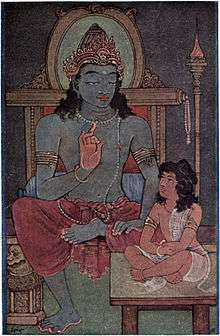
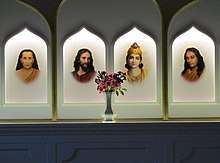
- Every new cosmic cycle — we are entering a new one now, the Age of Aquarius — brings into the world a teacher. People like Hercules and Hermes, Rama, Mithra, Vyasa, Zoroaster, Confucius, Krishna, Shankaracharya, the Buddha, the Christ, Mohammed — these are all Masters who have come from the same spiritual centre of the planet, called the Spiritual, or Esoteric, Hierarchy, which is made up of the Masters and Their initiates and disciples of various degrees.
- The only difference between the Christ and ourselves, the Buddha or Krishna and ourselves, is that They have manifested Their divinity. They know that They are Sons of God, and They demonstrate it.
- Rama Rama Rama Rama Sita Rama you chant
Do with devotion, and get the release you want...
As those Yama hordes arrive, to bid you to come
Spirit tries to escape the throat, Hari’s name will not come
Body systems cease working and our relative are bemoaning
Name of the Ocean-daughter’s lord will it come to your asking?
When your breath is blocked by phlegm in your throat
Vasudev Krishna’s name will be of no use then to shout
When you beautiful body breaks down and falls apart
As your eyes get blurred and dead, Ranga’s name will not depart
When your body juices mix up and collect down below
As the elements disintegrate, uttering God’s name will it allow.
Having born as a wicked and done many a cruel deed
As soul departs, Puranadara Vittala’s name will not proceed.- Purandara Dasa explains the agony of the last stages of death and advices taking the name of god at the time, as quoted in: M.K.V.Narayan Lyrical Musings on Indic Culture: A Sociology Study of Songs of Sant Purandara Dasa,Readworthy, 1 January 2010, p.81-82
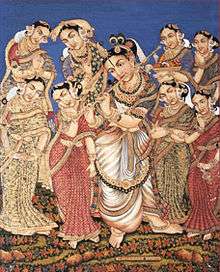

- Lord Krishna – the 8th incarnation of God Vishnu, the Creator– had eight wives (the Ashta-Bharyas). They are: Rukmini, Satyabhama,Jambavati, Kalindi, Mitravrinda, Nagnajiti, Bhadra and Laksmana. Besides Ashtabharyas, he had thousands of adoring female friends (16,000 are prominent among them) who were young girls known as Gopis. These were not his concubines as some non-Hindus may think of. The amorous relationship between Sri Krishna and the Gopi is the symbol of relationship between the creator and the human beings.
- Faruque Hasan in: The Realities and the Myths of The Clash of Civilizations, Lulu.com
- Hindus interpret the Diwali story based upon where they live:In North India they celebrate the story of King Rama's return to Ayodhya after he defeated Ravana by lighting rows of clay lamps. South India celebrates it as the day that Lord Krishna defeated the demon Narakasura. In western India the festival marks the day that Lord Vishnu, the Preserver (one of the main gods of the Hindu trinity) sent the demon King Bali to rule the nether world.
- Reenita Malhotra Hora in: Diwali, India's Festival of Light, National Geographic Society.
- His first eight wives as told in the Krishna story [appear] in this sequence, 1) Rukmini, 2)Satyabhama, and 3)Jambavati – their marriages are entwined due to a wondrous jewel derived from Surya, the Sun; 4)Kalindi; 5)Mitravinda, 6) Satya or Naganjiti; 7) Bhadra; 8) Laksmana or Madra. Each of these begets ten sons. … Their ranking consists of three sets of wives corresponding to the constituents of Krishna’s soverign rule from Dwarka. The first three of wives signifies Krishna’s majestic status: Rukmini signifies his majesty (sri), Satyabhama signifies his realm (w:Bhumi|bhumi]]); and intertwined with her is Jambavati, who signifies his victory (Vijaya). The second set signifies Aryavarta or the Realm of the Nobles which Krishna takes as his own; Kalindi represents its center, Satya represents its eastern side (and the Solar Dynasty), and Lakshmana represents its western side. The third set signifies the consolidation of Krishna’s Satvata clan, for both Mitravinda and Bhadra are Krishna’s paternal cousins.
- D Dennis Hudson in: The Body of God : An Emperor's Palace for Krishna in Eighth-Century Kanchipuram: An Emperor's Palace for Krishna in Eighth-Century Kanchipuram, Oxford University Press, 27 August 2008, p.264
- I am not manifest to all, being veiled by yoga-maya and its delusion the world knows Me not, the unborn and immutable (BG 7.25).
- Sri Krishna speaks of his power in the Bhagavat Gita quoted by Bansi Pandit in: [http://books.google.co.in/books?id=XA9zEw93KXEC&pg=PA62 The Hindu Mind: Fundamentals of Hindu Religion and Philosophy for All Ages (1 January 2001, p. 119
- On the fourth day, Govardhan puja is performed. On this day Krishna saved Gokul by lifting up the Govardhan Mountain on his little finger and holding it over the people as an umbrella.
- Longman in: Images, Longman, p.79
- Even if you try not to do your duty you will be perforce obliged to do it. Let the body complete the task for which it came into being. Sri Krishna also says in the Gita, whether Arjuna liked it or not he would be forced to fight. When there is work to be done by you, you cannot keep away; nor can you continue to do a thing when you are not required to do it, that is to say, when the work allotted to you has been done. In short, the work will go on and you must take your share in it -- the share which is allotted to you.
- There was a prophet of God in India who was dark in colour and his name was Kahan.
- History of Indian religions would immediately connect this description to Lord Krishna, who is invariably described in the Hindu literature as being dark of complexion.
- Prophet Mohammed in: The Belief In The Prophets, Alislam Organization
- My dear husband, You know all the transcendental truths, and by your mercy I have heard the glories of the Supreme Personality of Godhead, Lord Krishna. Oh Lord, now I long to hear from you the glories of the Ṥrīmad Bhagavad-gītā, which was spoken by Lord Krishna and, by hearing which, one's devotion to Lord Krishna increases.
- Parvati in Padma Purāṇa: Kāshināth Trimbak Telang The Bhagavad Gita (Telang translation)/Chapter 1,Wikisource
- The sounding of the mridanga (drum) in the kirtana (Devotional singing) is proclaiming loudly that those who have no devotion to Lord Krishna are very shameful and reprehensible. This is so because the mridanga sound diktum diktum, which means Oh! great shame! Oh! great shame!
- To attain Supreme peace, everlasting peace and enjoy Supreme bliss, Lord Krishna does not say that there are different Muktis and the liberated jiva (mukta) will go to Several lokas (Vaikuntha etc) and enjoy with different grades of happiness.
- Express News Service in: [http://www.newindianexpress.com/cities/bangalore/article1472272.ece Moksha is well defined in Gita], Express News Service, 21 February 2013
- If only people freed themselves from their beliefs in all kinds of Ormuzds, Brahmas, Sabbaoths, and their incarnation as Krishnas and Christs, from beliefs in Paradises and Hells, in reincarnations and resurrections, from belief in the interference of the Gods in the external affairs of the universe, and above all, if they freed themselves from belief in the infallibility of all the various vedas, Bibles, Gospels, Tripitakas, Korans, and the like, and also freed themselves from blind belief in a variety of scientific teachings and infinitely small atoms and molecules,...
- Leo Tolstoy in: Complete Leo Tolstoy 33 Collection, AEB Publishing, p.2497
- Second day of [Diwali] is called Naraka Chaturdashi or Chhoti Diwali. Narakasur, after defeating Lord Indra, snatched the magnificent earrings of Mother Goddess Aditi and took sixteen thousand daughters of gods and saints to his harem. Lord Krishna killed the demon, brought all women and earrings of Aditi. Lord Krishna came home early in the morning with demon blood on his forehead. Women massaged scented oil on Krishna and washed away dirt from his body. So we take oil massage and bathe before sunrise this day.
- Zak Vera in: Invisible River, AuthorHouse, 1 February 2010, p.180
- You must worship the Self in Krishna, not Krishna as Krishna.
- Swami Vivekananda in: The Complete Works of Swami Vivekananda ( Vol 1-9 ) [ Kartindo Classics], Kartindo.com, p.58
- Always resign yourselves to the Lord Shri Krishna. Always remember that we are but puppets in the Lord's hands. Remain pure always. Please be careful not to become impure even in thought, as also in speech and action; always try to do good to others as far as in you lies.
- Swami Vivekananda in The Complete Works of Swami Vivekananda/Volume 6/Epistles - Second Series/XXXIX Mother, Wikisource
- Krishna also relates that it was he, in a former incarnation, who communicated the indestructible yoga to an ancient illuminato, Vivasvat, who gave it to Manu, the great legislator. He, in turn, instructed Ikshwaku, the father of India's solar warrior dynasty. Passing thus from one to another, the royal yoga was guarded by the rishis until the coming of the materialistic ages. Then, due to priestly secrecy and man's indifference, the sacred knowledge gradually became inaccessible.
- In the family of religions, Hinduism is the wise old all-knowing mother. Its sacred books, the Vedas, claim, 'Truth is one, but sages call it by different names.' If only Islam, and all the rest of the monotheistic 'book' religions, had learned that lesson, all the horror of history's religious wars could have been avoided. Which other religion has its God say, as Krishna does in the Bhagavad Gita, 'All paths lead to me'
- Robert R. C. Zaehner in Sushama Londhe A Tribute to Hinduism: Thoughts and Wisdom Spanning Continents and Time about India and Her Culture, Pragun Publications, 2008, p.154
Krishna

Edwin F. Bryant in: Krishna, Oxford University Press, 2007
- While it is the Bhagavata Purana that occupies itself most particularly with the incarnation of Krishna, the Krishna story also occurs in significant detail in other Puranas, particularly the Vishnu Purana, Padma Purana, and the later Brahma Vaivarta Purana, and it is in this genre of literature the stories and legends that developed around his incarnation find their fullest expression.
- In: p.7
- Whatever one makes of a few slight references to Krishna in texts that are probably older than the Mahabharata, and of the many efforts to imagine him prior to his literary debut in the epic, the Mahabharata is the first text to portray him as both divine and human, and to conceive of his humanity and divinity in a forceful and complex scale.
- Alf Hiltebeitel in: p.23
- It is also, I believe, a revelation that Karna and the Kauravas consider the option of killing Krishna. Could Karna—and this never-failing spear—really have done that? We are left to ponder the death of God. And what did Karna think of this option?
- In: p.36
- The places and monuments related with Krishna and his life is being encroached, plundered and destroyed systematically, willfully and with all disregard to the cultural and historical heritage. One can well imagine what would have happened during foreign rules and invasions.
- In: p.37
- In chapter 7, Krishna reveals that the unquenchably active Nature is actually Krishna's own lower nature (prakriti). What Nature does, therefore, completely conforms to Krishna's will, even to the point that the Gita seems ultimately to teach that all one can do is be Krishna's instrument for Krishna’s activities. At times it appears that Arjuna himself has little say in his actions and will be compelled to do Krishna’s will no matter what Arjuna decides.
- In: p. 80
- Krishna also reveals that there is an eternal, unchanging, loving relationship between the individual soul and Krishna encompassed by the term bhakti, devotion. **In: p.80
- In the Bhagavad Gita, devotion to Krishna develops slowly out of the surrounding battle scene. Though that development never quite reaches the depths of attachment of later Krishna bhakti, the text provides an image of Krishna who is both the Lord of the Universe and one who incarnates in this world again and again to set things right and protect the dharma.
- They knew that Yadavas could establish Krishna Raj again and hence it had become necessary to drive wedge, a divide between Krishna and Yadavas. What would be better way than that of making Krishna a god (from god he became God during Bhakti movement)
- In: p.88
- Bless me [Narada to Krishna] that my remembrance [of them] will remain, so that I can travel about meditating [on them]. Thereafter, Narada entered another residence of Krishna's wives, O dear king, desiring to witness the yogamaya of the Lord of the lords of yoga...There he [saw] Krishna again, this time playing with dice with his beloved and with Uddhava...
- In:p.132
- After seeing this exhibition [at many places] of [Maya|yogamaya by Krishna, who was following human ways, Narada said to Hrishikesh Krishna smilingly: “We know that your yogamaya is hard to perceive, even for magicians. But it will manifest, O Soul of the lords of yoga, by service to your lotus feet”....“Give me you leave, O God. I will wonder about the worlds, which are overflowing with your glories, singing about your lilas which purify the earth.”
- In: p.133
The Greatest Farce of History
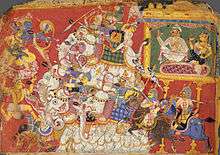

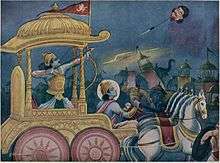
Gopal Chowdhary in: The Greatest Farce of History, Partridge Publishing, 4 March 2014
- Even the establishment of the system of Char Dham (Four Pilgrimage) related to Krishna's life— Gokul, Dwaraka, Puri and Badrinath— by Sankarachrya seems to be brilliant strategy to keep Krishna in a historical and mythical mode. Hindu or Vedic religion without Krishna or Krishna as God will be nothing but mere rituals and superstition.
- In: p.38
- ...Buddha, though quite different from Krishna, tried to change the socio-cultural scape of India through his scientific religion, even though he and Buddhism were forcibly exiled from this country.
- In:p.47
- Krishna, after exterminating the King of Mathura, did not take the power in to his hands but restored the old system of Vritya or Mandal (circle system) and ruling with the consensus in the consultation with the Samati or Sabha (council).
- In:p.94
- Moreover Krishna was very fond of the downtrodden and oppressed people such as his friends of childhood or his peers or sixteen thousand hapless women whom society could not accept even if they had been liberated by Krishna from the bondage of demon king of Pragjotishpur (Modern Assam) Narakasur. It was Krishna who adopted them, giving his name and telling them, they were his queens as he had given them all the Mangalsutra or matrimonial thread.
- In: p.112
- The influence of Krishna philosophy and his different temporal and non-temporal theories on the Buddhism could be deciphered from gleaning the various Buddhist texts, which seems to be the extension, supplantation, and elaboration of the [Krishna philosophy]…
- In:p.98
- ...at the time when Gita was happening, Krishna had attained the title of Vasudev as he was addressed as such by Bhisma Pitamah many times and others as well. Moreover, he had already destroyed Kans, w:JarasandhaJarasandh, and the other Prati-Vasudev at the beginning of war, and was going to destroy the remaining Prati-Vasudev in the ensuing war.
- In:p.102
- Moreover, Krishna was such a potent force that he had established a new benchmark in the form of Vasudev. What might have been very upsetting and rather threatening for the traditional social and political elites of the ancient India that he had provided virtual guidelines for becoming Vasudev through various acts and machinations. And his life itself was such a broader canvas of Vasudevhood that one could easily imbibe them becoming the Vasudev.
- In; P.103
- What might have shocked the highly regimented and stratified society of 1000-900 BC was the [[Yadavas act of straying from the Vedic fold and rituals, and mixing with Shudras or 'Dasa' initiated and formalized by Krishna. It was the very daring act of entering the marriage alliance with ‘Shudra’ or the tribal girl (Jambavati) and that too by such popular figure as Krishna who despite not being declared king or heir apparent like his elder brother, Balarama, used to enjoy more power and respect than a King.
- In: P.112
- Apart from Krishna, another Yadav, Ghor Angaris who was the second guru of Krishna after Guru Sandipan, enacted another revolutionary feat: He himself performed his last rites embracing the Jainism after leaving the Vedic religion.
- In:p. 113
- ...been appropriated by priestly class and composers of Upanishads without giving credit to Krishna. Moreover, the date of their composition has been stretched to the mythical time preceding the Gita and Krishna.
- In:p. 116
- ...there were many kingdoms such as Avanti, Chedi, Hastinapur, and others where Yadavas or Krishna's relatives were the reigning kings, they did not provide any help to the Mathura.
- In:p. 117
- It appeared Krishna's act of enforcing the Raj Dharma had angered all the kings of Aryavrata and that was why they did not come to his help. However, Krishna being not an ordinary person, had anticipated the non-cooperative attitude of his [kings of Aryavrata]…
- In:p. 118
- It appears to be more of a case of pre-planned conspiracy to obliterate Krishna – a force that had transformed the socio-political scape of ancient India, a visionary, social and political revolutionary, master par excellence in diplomacy and expert in warfare. While the stakes have succeeded in achieving first goal, as Krishna has become not only God but also God of gods, Yadavas survived their joint political-social-cultural-military onslaught.
- In:p.163-64
- In the 4th century BC, Chanakya refers to the story of Krishna's birth, while Megasthenes mentions that the Sourasenoi (Surasenas or Yadavas) hero-worshipped Herakles (Krishna). Their two great cities were Methora (Mathura) and Kleisobora (Krishnapura?) on the navigable river Yobares (Yamuna)....Herkales (Krishna) sent his daughter Pandala to rule over the kingdom of Mathura (Madura)
- In:p.179
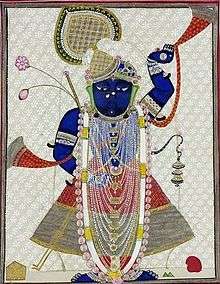
- Worship of Krishna as Swayam Bhagvan, or the “Supreme Being”, known as Krishna, arose in the Middle Ages in the context of the Bhakti movement. From the 10th century AD, Krishna became a favourite subject in performing arts and regional traditions of devotion developed for forms of Krishna such as Venkateshvara in Andhra Pradesh, Jagannatha in Orissa, Vithoba in Maharashtra and Srinathji in Rajasthan.
- In: p.181
- The Sanskrit word ‘krshna’ is primarily an adjective meaning “black”, “dark”, or “dark-blue”. Sometimes it is also translated as “all attractive”. In the Lalitavistara Sutra, Krishna is the chief of the black demons, the enemies of the Buddha.
- Monier Williams in: p.181
- The principal scriptures discussing Krishna's story are the Mahabharata, the Harivamsa, the Bhagavata Purana and the Vishnu Purana. Worship of a deity or hero called Krishna, in the form of Vasudeva, Bala Krishna or Gopal, can be traced to the 4th century BC.
- Norvin Hein in: p.181
- The earliest text that explicitly provides detailed descriptions of Krishna as a personality is the epic Mahabharata which depicts Krishna as an incarnation of Vishnu. Krishna is central to many of the main stories of the epic. The eighteen chapters of the sixth book (Bhishma Parva) of the epic that constitutes the Bhagavad Gita contain the advice of Krishna to the warrior-hero Arjuna, on the battlefield.
- In:p.181-82
- Krishna is already an adult in the epic [Mahabharta], although there are allusions to his earlier exploits. The Harivamsa, a later appendix to this epic, contains the earliest detailed version of Krishna's childhood and youth.
- In:p.182
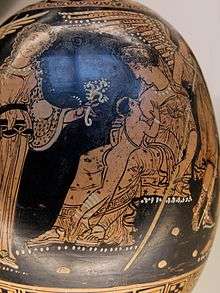
- Panini, the ancient grammarian (probably belonged to 5th century or sixth century BC) mentions a character called Vasudeva son of Vasudeva, and also mentions Kaurava and Arjuna which testifies to Vasudeva Krishna, Arjuna and Kauravas being contemporaries. Megasthenes (350-290 BC), a Greek ethnographer and an ambassador of Seleucus I to the court of Chandragupta Maurya mentioned about Herakles in his famous work Indica. Many scholars have suggested that the deity identified as Herakles was Krishna
- In:p.183
- There is no unanimity among the theologians and religious figures as what is the position of Krishna. It shows he is being interpreted as per the whims and fancies of the person and sects concerned. This also proves the historicity of Krishna.
- In:p.185
- Garbe believes Krishna to have lived about two hundred years before Buddha, to have been son of Vasudeva, to have founded a monotheistic and ethical religion, and to have been eventually deified and identified with the god Vasudeva, he founded. In the Mahabharata we have all traditions about Krishna that survived until then, non-Aryan hero, a spiritual teacher, a tribal god.
- In:p.193
- In the Buddhist texts the term 'kala' has been used for denote the villainous men or of wicked tendency, while in the Jain texts the term 'Krishna or Vasudev' has been used for referring to the great personality, called as the 'Slaka Purush'.
- In: p.195
- It is clear that Krishna's historicity and legacies have been highjacked to the non-temporal level at the best and mythical level at the worst. If seen from objective point of view, there should not be any doubt about the historicity of Krishna and Mahabharata period
- In: p.196
- Krishna and post-Krishna era underlines the rather high period of Indian socio-political scape when ruling elites or Kshatriya was like philosopher king. The Gana-Sangh system or rather republican credo that Krishna had displayed in his stately conduct or the democratic principles of debate, discussion, and unanimity or a sort of consensus characterizing Yadavas and Krishna’s conduct testifies this.
- in: p.208
- Krishna: Political Philosophy If Plato is called the father of politics and Machiavelli as that of modern politics, then Krishna could be undoubtedly designated as the father of politics of all the time. It is another matter that he has been relegated to the mystical realm, making him the God Himself.
- In: p.239
- ...republican credo of Yadavas were refined and institutionalized by Krishna, and for upholding it, he did not spare his own relatives such as Kans, Shishupal and others. Moreover, for the sake of republican credo of electing the capable King irrespective of whether he is elder, Krishna took part in the great war of Mahabharata on the side of Pandavas, who were the sons of younger brother, Pandu of Hastinapur.
- In: p.244
- It is no surprise that Chankya or Kautilya cast off his political theory based on the organizational pattern, appropriating not only the nomenclature but also various aspects of Krishna real politicking and diplomacy. Of course, without acknowledging Krishna and his contribution to the humanity. Even Buddha, whose three-fourth tenets of Buddhism is based on Krishna’s Samkhya, Karma Yoga, Gyana Yoga and Gita has not named Krishna in his acknowledgments, though he has done so indirectly by conceding the ancient traditions, thinkers and philosophers.
- In: p.245
- ...Nanda the foster parents of Krishna and his uncle who was the brother of Krishna's father has been referred as Mandaladhish (Head of Mandal) of Gokul Mandal. Therefore, the Mandal was administrative unit and the kingdom was organized into different Mandal whose head was responsible for the administration, tax collection and other matters.
- In: p.245
Commentary on the Bhagavad Gita: The Song of the Transcendental Soul
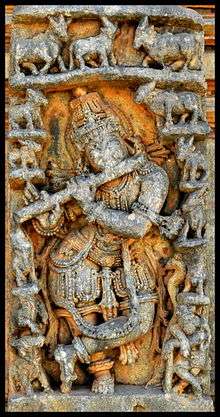
Sri Chinmoy in: Commentary on the Bhagavad Gita: The Song of the Transcendental Soul, R. Steiner Publications, 1973
- Sri Krishna stole the hearts of the Gopis unconditionally. The Gopis stole His Ecstasy unreservedly.
- In: p.123
- Man’s growing divinity cries for the human perfection in Sri Krishna the man. In Sri Krishna’s humanity lies man’s promise of becoming divine.
- In: p.123
- Sweetness and grace inexpressible, bond unbreakable, sacrifice unfathomable — this indeed is Radha, the Mother-Heart of Sri Krishna.
- In: p.123
- Arjuna is the ascending human soul. Krishna is the descending divine Soul. Finally they meet. The human sou says to the divine Soul: “I need you.”The divine Soul says to the human soul: *I need you, too. I need you for my self-manifestation. You need me for your self-realisation.” Arjuna says: “O, Krishna, you are mine, absolutely mine.” Krishna says: “O, Arjuna, no mine, no thine. We are the Oneness complete, within, without.”
- In: p.xi
- Sri Krishna is the beloved Boatman who untiringly plies His Boat of Consciousness between India’s unparalleled history and Her unrivalled spirituality.
- In: p.124
- Sri Krishna’s Flute stirs the Universal Consciousness. Sri Krishna’s Gita enchants the Transcendental Consciousness.
- In: p.124
- Sri Krishna plays on His Flute. We hear. We do something more. We barter our body’s dust with His Soul’s Plenitude.
- In: p.124
- The influence of the Mahabharata is a flowering of centuries. The influence of Sri Krishna is the Blessing for Eternity.
- In: p.124
- The Pandavas had love for Sri Krishna. Sri Krishna had not only love but also unstinting concern for the Pandavas.
- In: p.124
Part II: The Kind, the Prince, the Son
Sri Chinmoya in: Part II: The Kind, the Prince, the Son, Sri Chimoya Library
- Radha carries the human soul into Sri Krishna’s Heart. Sri Krishna transforms the human soul into the Divine Soul and commands it to play its role in the Divine Play.
- The Gita is Sri Krishna’s Heart, his Vision-in-Fulfilment. The Gita is humanity’s Breath, its Journey towards Immortality.
- For an earth-bound soul, the Gita can fruitfully reconcile the dark problems of human life. For a Heaven-seeking soul, the Gita can awaken a new consciousness of ever-increasing Bliss.
- I do. I refuse to accept the invitation of Desire. Sri Krishna does. He comes in to illuminate my consciousness.
- My ideal is to mount higher and higher up the ladder of divine evolution. Sri Krishna’s Ideal is to make of Himself the divine Sacrifice to strengthen the rungs of the ladder.
- Sri Krishna is sweet when I realise Him in the perfection of my “I". Sri Krishna is sweeter when I realise Him as the Doer. Sri Krishna is sweetest when I realise Him as the Pilot of all my actions and myself as His dedicated instrument.
- An aspirant’s is the cry that compels Sri Krishna to seize him with the very madness of love.
- A Vaishnava’s life is love-intoxicated. He is a portion of Sri Krishna’s individuality, perpetuating all the divine qualities of an everlasting Life.
- When I live in Sri Krishna’s Soul, I see the Truth from above. When I live in Sri Krishna’s Heart, I see the Truth from within. When I live in Sri Krishna’s Body, I see the Truth from without.
- Sri Krishna is the shoreless ocean of Bliss. But as soon as I sincerely dedicate myself to Him, He presents me with His own Boat and takes me to the boundless Shore, the Golden All.
- Sri Krishna walked the soil to annihilate the philosophies of world-shunning spirituality and of world-grasping materialism. He established on earth the “Dharmarajya,” the Kingdom of the Inner Law. He restored the true spirit of Kshatriya heroism, motivated not by human ego, but by Divine Will, making man a devoted and active instrument of the Supreme. He brought down to the earth-consciousness the supreme Truth that earth and earthly life, being inherently divine, must be made outwardly divine, fully and totally, in every sphere, in every aspect.
Bhagavad-Gita by Swami Prabhupada, ISKCON (1995)
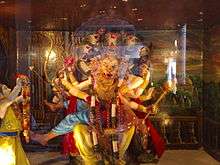
- As the embodied soul continuously passes, in this body, from boyhood to youth to old age, the soul similarly passes into another body at death. A sober person is not bewildered by such a change.
- Text 2.13
- O son of Kunti, the nonpermanent appearance of happiness and distress, and their disappearance in due course, are like the appearance and disappearance of winter and summer seasons. They arise from sense perception, O scion of Bharata, and one must learn to tolerate them without being disturbed.
- Text 2.14
- Whenever and wherever there is a decline in religious practice, O descendant of Bharata, and a predominant rise of irreligion — at that time I descend Myself.
- Text 4.7
- To deliver the pious and to annihilate the miscreants, as well as to reestablish the principles of religion, I Myself appear, millennium after millennium.
- Text 4.8
- One who knows the transcendental nature of My appearance and activities does not, upon leaving the body, take his birth again in this material world, but attains My eternal abode, O Arjuna.
- Text 4.9
- A learned person sees that although there are different bodies, every living being is the soul. He also sees that Krsna as the Supersoul is equally present in all bodies.
- Text 5.18
- Those miscreants who are grossly foolish, who are lowest among mankind, whose knowledge is stolen by illusion, and who partake of the atheistic nature of demons do not surrender unto Me.
- Text 7.15
- It should be understood that all species of life, O son of Kunti, are made possible by birth in this material nature, and that I am the seed-giving father...of all living entities.
- Text 14.4
The Gita Govinda
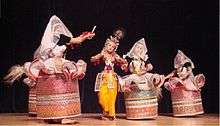
In the soft awakenings Spring-time, when ‘tis hard to live alone.
Jayadeva, translated by Edwin Arnold in:The Gita Govinda, Wikisource
- The sky is clouded; and the wood resembles
The sky, thick arched with a black tamala boughs;
Oh Radha, Radha! Take this soul that trembles
In life's deep midnight, to thy Golden house.
So Nanda spoke -- and led by Radha’s spirit,
The feet of Krishna found the road aright;
Wherefore, in bliss which all high hearts inherit,
Together taste they love's divine delight.
- Beautiful Radha, Jasmine bosomed Radha,
All in the Spring-time waited by the wood
For Krishna fair, Krishna the all-forgetful, -
Krishna with earthly love's false fire consuming –
And some one of her maidens sang this song: --
- I know where Krishna tarries in these early days of Spring,
When every wind from warm Malay brings fragrance on its wing;
Brings fragrance stolen far away from thickets of the clove,
In Jungles where the bees hum and the Koil flutes her love;
He dances with the dancers, at the merry morrice one,
All in the budding Spring-time, for ‘tis sad to be alone.
- I know how Krishna passes these hours of blue and gold,
When parted lovers sigh to meet and greet and closely hold
Hand fast in hand; and every branch upon the Valkul-tree
Droops downward with a hundred blooms, in every bloom a bee;
He is dancing with the dancers to a laughter-moving tone,
In the soft awakenings Spring-time, when ‘tis hard to live alone.
- When Kroona-flowers, that open at a lover's lightest tread,
Break, and, for shame at what they hear, from white blush and modest red;
And all the spears on all the boughs of all the Ketuk-glades
Seem ready darts to pierce the hearts of wandering youths and maids;
‘Tis there thy Krishna dances till the merry drum is done,
All in the sunny Spring-time, when who can live alone?
- Where the breaking forth of blossom on the yellow Keshra-sprays
Dazzles like Kama’s sceptre, whom all the world obeys;
And Patal-buds fill drowsy bees from pink delicious bowls,
As Kama’s nectared goblet steeps in languor human souls;
There he dances with the dancers, and of Radha thinketh none,
All in the warm new Spring-tide, when none will live alone.
- Mark this song of Jayadev!
Deep as pearl in ocean-wave
Lurketh in its lines a wonder
Which the wise alone will ponder:
Though it's seemeth of the Earth,
Heavenly is the music's birth;
Telling darkly of delights
In the wood, of wasted nights,
Of witless days, and fruitless love,
And false pleasures of the grove,And rash passions of the prime,
And those dances of Spring-time;
Time, which seems so subtle-sweet,
Time, which pipes to dancing-feet,
Ah! So softly -- Ah! So sweetly --
That among those wood-maids featly
Krishna cannot choose but dance,
Letting pass life's greater chance.
- Yet the winds that sigh so
As they stir the rose
Wake a sigh from Krishna
Wistfuller than those;
All their faint breaths swinging
The creepers to and fro
Pass like rustling arrows
Shot from Kama’s bow:
Thus among the dancers
What those Zephyrs bring
Strikes to Krishna's spirit
Like a darted sting.
- And as if -- far wandered --
The traveller should hear
The bird of home, the Koil,
With nest-notes rich and clear;
And there should come one moment
A blessed fleeting dream
Of the bees among the mangoes
Beside his native stream;
So flash those sudden yearnings,
That sense of a dearer thing,
The love and lack of Radha
Upon his soul in spring.
- Then she, the maid of Radha, spake again;
And pointing far away between the leaves
Guided her lovely Mistress where to look,
And note how Krishna wantoned in the wood
Now with this one, now that; his heart, her prize;
Panting with foolish passions, and his eyes
Beaming with too much love of those fair girls --
Fair, but not so as Radha; and she sang:
- See, Lady! How thy Krishna passes these idle hours
Decked forth in fold of woven gold, and crowded with forest flowers;
And scented with sandal, and gay with gems of price --
Rubies to mate his laughing lips, and diamonds like his eyes; --
In the company of damsels, who dance and sing and play,
Lies Krishna, laughing, toying, dreaming his Spring away.
- One, with star-blossomed champak wreaths, woos him to rest his head
On the dark pillow of her breast so tenderly outspread;
And o’er his brow with roses blown she fans a fragrance rare,
That falls on the enchanted sense like rain in thirsty air,
While the company of damsels wave many an odorous spray,
And Krishna, laughing, toying, sighs the soft Spring away.
- Another, gazing in his face, sits wistfully apart
Searching it with those looks of love that leap from heart to heart;
Her eyes -- afire with shy desire, veiled by their lashes black --
Speak so that Krishna cannot choose but send the message back,
In the company of damsels whose bright eyes in a ring
Shine round him with soft meanings in the merry light of Spring.
- The third one of that dazzling band of dwellers in the wood --
Body and bosom panting with the pulse of youthful blood --
Leans over him, as in his eyes lightsome thing to speak;
And then with leaf-soft lip imprints a kiss below his cheek;
A kiss that thrills, and Krishna turns at the silken touch
To give it back -- Ah, Radha! forgetting thee too much.
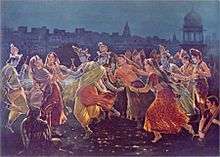
Where the tall bamboos bristle like spears in battle ranks.
And plucks his cloth to make him come into the mango-shade,
Where the fruit is ripe and golden, and the milk and cakes are laid:
Oh! golden-red the mangoes, and glad the feasts of Spring,
And fair the flowers lie upon, and sweet the dancers sing.
- And one with the arch smile beckons him away from Jumna’s banks,
Where the tall bamboos bristle like spears in battle ranks.
And plucks his cloth to make him come into the mango-shade,
Where the fruit is ripe and golden, and the milk and cakes are laid:
Oh! golden-red the mangoes, and glad the feasts of Spring,
And fair the flowers lie upon, and sweet the dancers sing.
- Sweetest of all that Temptress who dances for him now
With subtle feet which part and meet in the Rasa measures slow,
To the chime of silver bangles and the beat of rose-leaf hands,
And pipe and lute and cymbal played by the woodland bands;
So that wholly passion-laden-eye, ear, sense, soul o'er come --
Krishna is there as in the forest; his heart forgets its home.
- Krishna, made for heavenly things,
'Mid those woodland singers sings;
With those dancers dances featly,
Gives back soft embraces sweetly;
Smiles on that one, toys with this,
Glance for glance, and kiss for kiss;
Meets the merry damsels fairly,
Plays the round of folly rarely,
Lapped in milk-warm Spring-time weather,
He and those brown girls together.
- And this shadowed earthly love
In the twilight of the grove,
Dance and song and soft caresses,
Meeting looks and tangled tresses,
Jayadev the same hath writ,
That ye might have gain of it,
Sagely its deep sense conceiving
And its inner light believing;
How that Love -- the mighty Master,
Lord of all the stars that cluster
In the sky, swiftest and slowest,
Lord of highest, Lord of lowest -
Manifests Himself to mortals,
Winning them towards the portals
Of his secret house, the gates
Of that bright paradise which waits
The wise in love. Ah, human creatures!
Even your fantasies are teachers.
Mighty Love makes sweet in seeming
Even Krishna's woodland dreaming;
Mighty Love sways all alike
From self to selfishness. Oh! Strike
From your eyes the veil, and see
What love willeth Him to be
Who in error, but in grace,
Sitteth with that Lotus-face,
And those eyes whose rays of heaven
Unto phantom-eyes are given;
Holding fast of foolish mirth
With these visions of the Earth;
Leaving Love, and Love imparting;
Yet with sense of loss upstarting: --
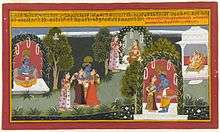
who laughed when the Radha glided, hidden, by,
An all among those damsels free and bold
Touch Krishna with a soft mouth, kind and cold;
And like the others leaning upon his breast,
Unlike the others, left their Love’s unrest;
And like the others, joining in his song,
Or like the others, made him silent long.
- For the cloud that the veils of the fountains
Underneath the sandal mountains,
How -- as if the sunshine drew
All its being to the blue --
It takes flight and seeks to rise
High into the purer skies,
High into the snow and frost,
On the shining summits lost!
Ah! And how the Koil's strained
Smites the traveller with pain, --
When the mango blooms in Spring,
And "Kahoo", "Kahoo", they sing --
Pain of pleasure not yet won,
Pain of journeys not yet done
Pain of toiling without gaining,
Pain ‘mid gladness of still paining.
- But may he guide us all to glory high
who laughed when the Radha glided, hidden, by,
An all among those damsels free and bold
Touch Krishna with a soft mouth, kind and cold;
And like the others leaning upon his breast,
Unlike the others, left their Love’s unrest;
And like the others, joining in his song,
Or like the others, made him silent long.
See Also
External links
- Bhagavad-Gita by Swami Prabhupada,ISKCON (1995)
- [http://www.krishnapath.org/art-gallery-home/art-gallery-of-krishna-and-his-devotees-transcendental-pastimes/ Art Gallery of Krishna & His Devotees Transcendental Pastimes}
- Lord Krishna Quotes
